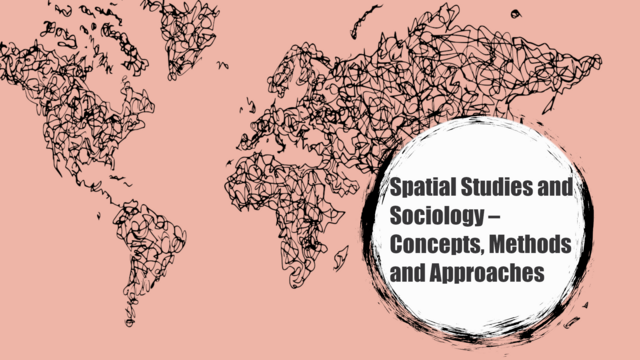You are here:

Spatial Studies and Sociology – Concepts, Methods and Approaches
Anna Steigemann (U Regensburg)
- Beginning:
- Thursday, 06 May 2021 10:00
- End:
- Friday, 07 May 2021 16:00
This hands-on seminar/workshop will introduce the participants to basic techniques for collecting, interpreting, and analyzing qualitative data, but also help the PhD candidates to reflect on their wider methodological approaches and data collection.
In addition, and based on the PhD candidates’ individual projects, we will operate on two interrelated dimensions, one focused on the theoretical approaches to various types of qualitative research, the other focused on the practical techniques of data collection, such as: identifying key informants, selecting respondents, collecting field notes, conducting interviews, analyzing data, writing, reflecting on own positionalities, and presenting findings. We also will discuss the theories and methods of qualitative (spatial) practice through input lectures, project and methods presentation and discussion based on your projects, complemented by literature discussions as well as practicing qualitative research techniques on each other. We will also talk about the practical issues involved in the design and implementation of qualitative research methods.
As a qualitative research methods workshop, the class is organized with the following objectives in mind:
(1) To give you basic training in qualitative social and spatial research in the field of area studies. This requires exposing you to issues of conceptualization, theory, research design, and strategies for framing questions.
(2) To consider the various domains or topical areas in social sciences and area studies, where qualitative work has made major contributions. This includes reflecting on the usage of qualitative method in interpretive, descriptive, and explanatory research.
(3) To continue the discussions on the ethical responsibilities of qualitative researchers, who have closer contact with “subjects” and “informants” as rather “field partners” than other researchers typically do.
(4) To think collectively and critically about the forms of writing (articles, dissertations, books, etc.) and professional presentations that graduates of interdisciplinary area studies must master to present qualitative work to their peers and the public.
Theoretically, we will consider questions such as the following: What is qualitative research? What is it best suited for? What are the standards of scientific evidence? What are the roles of induction and deduction in qualitative research and what approach for what topic? How can we operationalize key terms and concepts for empirical research? Can qualitative research explain social phenomena, or only interpret them?
Practically, we will consider questions such as the following: How do you go about starting a project? How do you connect theory, research design, and data collection and what are the challenges in this context? How should one structure an interview schedule or (participant) observation? How do I prepare archival or field work? How many interviews are enough? How does one ensure reliability? How does one write good fieldnotes? How does one determine the best sampling strategy? What is coding? How does one write an ethnographic paper?
Seminar faciliator
Prof. Dr. Anna Steigemann is an urban researcher and internationally and interdisciplinary trained scholar in and across the fields of urban studies, urban planning, sociology, architecture, anthropology, and migration research.
Her current main research interests are critical urban research, planning and social theories, and ethnographic research methods. These include particularly neighborhood and community studies, urban informality, governance, post-colonial theory, international comparative research and the development of new and more collaborative socio-spatial research methods.
Time: 06.05.2021, 10:00-13:00 and 07.05.2021, 10:00-16:00
Cooperation: Leibniz ScienceCampus
back